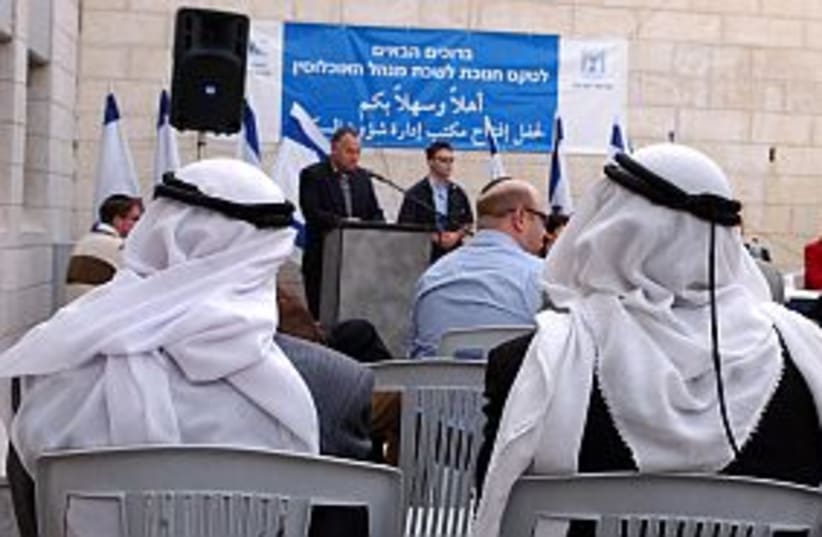Fadel Tahbub, 64, a resident of Wadi Joz, also won't be celebrating the reunification of Jerusalem. It's not that he doesn't love his city, the place where he was born, grew up, got married and has lived all his life. On the contrary, he says that precisely because he loves Jerusalem, he cannot take part in an official Israeli celebration. When the Six Day War (in Arabic the June or haziran War) broke out, Tahbub was 24 and he recalls the dramatic events clearly.
"My life was never the same after this war," he says, sorting out the facts and the memories, holding on to them for a while and then letting them go as if they were prayer beads. "I was a young man at that time, just starting out my career. I was working at some trade company when I first learned that the war broke out. My family and I lived in Abu Tor and I came home from work immediately. We were literally glued to the radio, listening to Sawt al-Arab [the Voice of Arabs, an Egyptian radio station that broadcast from Cairo]. At first the prognosis was optimistic, which fitted our expectations. We heard that the Egyptian army was victorious, and no one doubted this information, as nobody expected it would be defeated so quickly and so ruthlessly."
He describes the shock of the first days of occupation, when Israeli soldiers and tanks were seen on the streets: "There were curfews, tanks parked outside our houses. It was almost impossible for us to digest this, especially since we were all preparing for the victory of the Arab armies, and were surprised by their total collapse. Before the war, I wasn't really what is called a political enemy, but the view of Israeli soldiers in our streets made me think obsessively about my future and future of my people, and in just a few weeks I was already taking part in the resistance movement in the city."
He says young Palestinians who were outraged by the occupation didn't exactly have a clear idea of their political future.
"We were struggling against the occupation, because we wanted to put an end to it. However at that time the idea an of independent Palestinian state wasn't yet fully developed. We were part of Jordan before, but since 80 percent of Jordan's population was Palestinian at that time, we felt we were an integral part of the state. We held public office and had Jordanian IDs. Israeli rule was and will always remain foreign and unacceptable for us," says Tahbub, calmly telling his story, slowly sipping fine coffee in one of the many coffee shops on busy az-Zahra Street.
WITHIN JUST a few months, Tahbub became an active member of a resistance group and fought against the IDF.
"Our main goal was to prevent the Israelis from taking people out of the city. At that time the army offered many Jerusalemites a free ride to the Allenby Bridge so that they could join their families in Amman - and stay there of course. We understood that what the Israeli government was seeking was the de-Arabization of Jerusalem, and we tried to fight that. Sometimes we slashed tires of the buses, other times we threw hand grenades at the soldiers - anything we could do to prevent them from getting rid of the Arabs here."
By the end of 1968 Tahbub was arrested. He was sentenced to two life sentences and stayed in jail for 16 years. "The war changed the whole course of my life. I don't know what it would look like if it hadn't occurred, but it's hard for me to believe that I would have spent 16 years in prison."
He was released in 1985, along with 1,150 other Palestinians, as a part of the "Jibril deal," and traveled to Tunis, where Yasser Arafat had his headquarters. After the formation of the Palestinian Authority, he returned and was elected to the Palestinian Legislative Council.
Tahbub, who has for years promoted joint Israeli-Palestinian meetings and peace talks, is not at all optimistic. "We will soon mark 40 years since this war, and the occupation is still here. Jerusalem is being cut off from the West Bank, and its social fabric is now completely torn apart, with natural neighborhoods of the city separated from it by the wall. However, this will not get the Israelis the results they are wishing for. Jerusalem is not united today, nor will it be tomorrow, and the political struggle for it will continue until it becomes the capital of a viable Palestinian state, side by side with Israel."
Tahbub believes that Jerusalem, the city of peace, as he calls it, belongs to both nations and should be the capital of both, with free movement between its two parts. "It's hard for me to believe that this is something that will happen, but I hope that the Israeli people will be smart enough to realize that by destroying the chance of two-state solution, they are also destroying their chance for peace.
"Naturally," he concludes, "I cannot celebrate Jerusalem Day. For me and thousands of others like me, this day marks the beginning of a new, bleak era in our lives. And on this day we pray that this period will come to an end before we mark 50th, 60th or 100th anniversary of this war."

